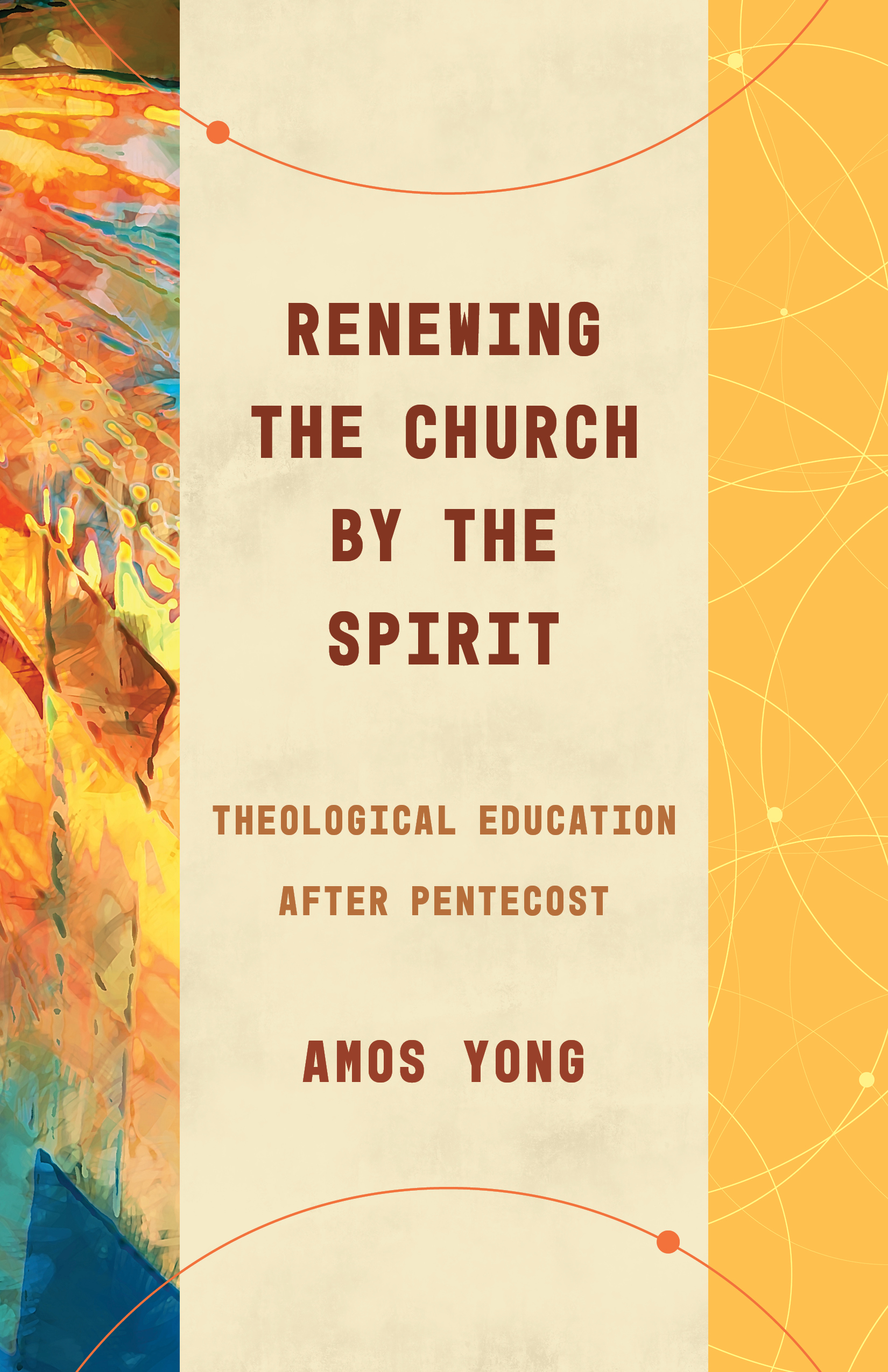Amos Yong: Renewing the Church by the Spirit
 Amos Yong, Renewing the Church by the Spirit: Theological Education After Pentecost, Theological Education Between the Times (Grand Rapids, MI: William B. Eerdmans Publishing Co., 2020), 167 pages, ISBN 9780802878403.
Amos Yong, Renewing the Church by the Spirit: Theological Education After Pentecost, Theological Education Between the Times (Grand Rapids, MI: William B. Eerdmans Publishing Co., 2020), 167 pages, ISBN 9780802878403.
Renewing the Church by the Spirit: Theological Education After Pentecost by Dr. Amos Yong is part of the series entitled “Theological Education Between the Times” with Ted A. Smith as the series editor. The TEBT project is funded by the Lilly Endowment, Inc., and gathers diverse groups to dialogue about “the meanings and purposes of theological education in a time of deep change.”[i] Other books in this series include After Whiteness: An Education in Belonging by Willie James Jennings and Attempt Great Things for God: Theological Education Diaspora by Chloe T. Sun.
Amos Yong places Pentecostal perspectives front and center in his thought-provoking book. He begins with an introduction asserting that theological education has become “flattened” and is facing real difficulties in the twenty-first century. When Yong wrote this book, Gordon-Conwell Theological Seminary had not yet made public its decision to close their main campus. Indeed, recent news such as this with Gordon-Conwell along with severe budget cuts and lowering enrollment in other seminaries provokes serious thought for all Christian educators, making Yong’s book particularly timely. What exactly are we to do in response to our present challenges in education, and what will happen to the Church if we do not respond properly?
In addressing the challenges facing theological education today, Yong argues that the Holy Spirit is the way to renew theological education right now. Throughout the book Yong utilizes the coined term “Spirit-ed” education, and it is evident that he has spent years thinking creatively with the Spirit about the topic of Pentecostal theological education and what it could look like if we got over some of our long-held assumptions of a set historical form. The Spirit of God is creative, after all, and leads us with flexibility and renewal.
Part I discusses the Church amid world Christianity which Yong identifies as the “who” carrying “the heart and soul of theological education.”[ii] Part 2 considers witness in “glocal” (simultaneously global and local) contexts which the author views at the “why,” i.e., serving as the “hands and works of theological transformation.”[iii] Part 3 then explores aspects of “how” theological education achieves its purposes and accomplishes its mission within our networked world. Considering various aspects of pedagogy, Yong views this section as addressing the “mind and task of theological exploration.”[iv] Highlights of these three parts follow.
The world has certainly changed, and this, Yong argues, should affect our theological education which he believes to be in trouble. He refers to Thomas Friedman’s book The World is Flat, believing that Friedman’s concepts have direct application to the present issues and needs of theological education.[v] Yong states, “By identifying the world as flat, Friedman is theorizing about the collaborative, horizontal world created by the forces of globalization. A flat world eliminates both the institutional hierarchy that dominated the medieval and early modern world and the intermediaries that facilitated the transfer of goods, services, and knowledge.”[vi]
The world has certainly changed. Theological education is changed. How should we respond?
With the Church being in a large global context that is localized in unique ways across the world, Yong reminds the reader that theological education is a service to the whole Church and therefore must draw from her varied voices and perspectives. In order to prepare students properly to serve the entire Church, theological educators must teach new skills which include how to get things done through developing a “network of imagination,”[vii] listening to other viewpoints, and seeking out and valuing all voices.
Yong has boldly announced that our living relationship with the Spirit can be the means for a renewed theological education.
Yong argues that the Holy Spirit was already leading in this direction when, at Pentecost, He poured out speaking in tongues so all people groups could hear in their own language. The author reminds us that Luke was “attempting to communicate to his readers that the world is already there at the heart of the establishment of the fellowship of the Spirit as the new people of God.”[ix] Along with this wonderful move of the Spirit came thriving centers of theological education. Yong notes that “the first generation of the church as the people of God also featured a plurality of centers for theological education and instruction, involving diverse leaders spread out across the face of the known world.”[x]
Yong has boldly announced that our living relationship with the Spirit can be the means for a renewed theological education. He states the challenge: “The transition from a hierarchical, authoritarian, elitist, and structured Christendom to a porous, organic, (digitally) networked, and experientially revitalized church both admonishes the status quo of theological education and charts pathways for effectively engaging the fellowship of the Spirit’s present and discernible trends.” In the third part, Yong offers various practical considerations for potential change as we walk with the Spirit and join in the renewal of theological education.
This book motivates us to march forward with the Spirit in thought and prayer to discover what is next …
Reviewed by Carolyn Tennant
Publisher’s page: https://www.eerdmans.com/Products/7840/renewing-the-church-by-the-spirit.aspx
Notes
[i] Yong, Amos. Renewing the Church by the Spirit: Theological Education After Pentecost. Theological Education Between the Times. (Grand Rapids, MI: William B. Eerdmans Publishing Co., 2020). Kindle Edition.
[ii][ii] Ibid., location 29.
[iii] Ibid., location 47
[iv] Ibid., location 57
[v] Thomas L. Friedman, The World Is Flat: A Brief History of the Twenty-First Century, 3rd ed. (New York: Farrar, Straus & Giroux, 2007).
[vi] Yong, location 156.
[vii]Ibid., location 33.
[viii] Ibid, location 38.
[ix] Ibid., location 49.
[x] Ibid., location 50.
Category: Ministry, Summer 2022


